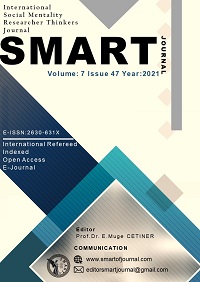Author :
Abstract
Dünyamız; Sanayi Devrimi’nin getirdiği kitlesel üretim modelinin benimsenmesi, hızlı nüfus artışı ve küreselleşme sürecinin hızlanması ile beraber büyük dönüşümler yaşamış ve bu dönüşümler mal ve hizmet taleplerindeki artış ve çeşitlenmeyi de beraberinde getirmiştir. Özellikle 1980’lerden sonra yaşanan teknolojik ve lojistik gelişmelerle birlikte küreselleşme sürecinin hızlanması; bu yeni duruma adapte olmak, dünya güç dengelerinin içinde bulunmak ve çağı yakalamak isteyen ülkeleri ekonomik yönden güçlü olmak için üretim artışını sağlayarak kalkınmak zorunluluğuyla baş başa bırakmıştır. Aşırı şekilde artan üretim artışı ise dünyanın kıt kaynaklarının etkin kullanımını ve dağılımını bozmakta aynı zamanda ekolojik sistemi tahrip ederek çeşitli canlı türlerinin yok oluşuna, su kaynaklarının ve toprak zenginliğinin kaybolmasına, doğal afetlere ve küresel ısınmaya zemin hazırlamaktadır. Bu olmuş ve olası etkiler son yıllarda özellikle Batılı toplumların ilgisini çekmiş ve ‘ekolojik dengenin bozulması pahasına gerçekleştirilen üretim’e karşı tepkiler günden güne artmıştır. Bu bilinçlenme ile yapılan çalışmalar sonucunda; Birleşmiş Milletler çatısı altında hemen hemen tüm dünya toplumları, gelecek nesillerin ihtiyaçlarını karşılayabilme şanslarını ellerinden almayacak şekilde kaynakları tüketmeden, sürdürülebilir kalkınmayı ortak hedef olarak belirlemişlerdir. Bu doğrultuda; 2016 yılında yürürlüğe giren 17 ana maddeden oluşan, 2030 yılına kadar ulaşılması hedeflenen “Sürdürülebilir Kalkınma İçin Küresel Amaçlar” Birleşmiş Milletler’e üye 193 ülke tarafından evrensel eylem planı olarak benimsenmiştir. Bu çalışmada; ‘sürdürülebilir kalkınma’ kavramı küreselleşme çerçevesinde ele alınarak incelenmeye çalışılacaktır.
Keywords
Abstract
Our World has undergone great transformations together with the adoption of the mass-production model brought by the Industrial Revolution, the rapid growth of the population, and the acceleration ofthe globalization process; and these transformations have brought alongan increase and diversification in demand for goods and services.Especially the acceleration of the globalization process together with the technological and logistic developments experienced after the 1980s have left the countries that desire to adapt to this new situation, to be in the balance of power in the World, and to catch the era with the necessity of developing by increasing the production to be economically strong. The excessivegrowth of production increase, on the other hand, disrupts the efficient use and distribution of the world's scarce resources. It also paves the way for the extinction of various living species, the loss of water resourcesand soil wealth, natural disasters, and global warming by destroying the ecological system. Theserealized and possible effects have attracted the attention of the Western societies especially inrecent years and the reactions against “the production carried out at the expense of disrupting the ecological balance” have increased day by day. As a result of the studies conducted with this awakening, nearly all World societieshave united under the umbrella of the United Nationsand set sustainable development as a common goal without consuming resources in a way not to take away the chance of meeting the needs of future generations. Thus, "Sustainable Development Goals" consisting of 17 main articles that came into force in 2016 and are aimed to be fulfilleduntil 2030, have been adopted as a universal action plan by 193 member countries of the United Nations. This study aims to examine the concept of "sustainable development" within the framework of globalization.
Keywords
- Aksu, C. (2011). Sürdürülebilir Kalkınma ve Çevre, Güney Ege Kalkınma Ajansı,
- Aksu, C. (2011). Sürdürülebilir Kalkınma ve Çevre, Güney Ege Kalkınma Ajansı, http://geka.gov.tr/Dosyalar/o_19v5e00u1ru61bbncf2qmlcpv8.pdf
- Ateş, D. (2006). “Küreselleşme: Ne Kadar Boyutlu?” Doğuş Üniversitesi Dergisi, 7(1):25-38.Başar, S. (2007). İktisadi Büyümenin Çevresel Etkileri, İmajYayınevi, Ankara.
- Başkaya, F. (1997). Kalkınma İktisadının Yükselişi ve Düşüşü, İmgeYayınları, Ankara.
- Bayar, F. (2008). “Küreselleşme Kavramı ve Küreselleşme Sürecinde Türkiye”, Uluslararası Ekonomik Sunumlar Dergisi, 32:25-34.
- Bayraktutan, Y. & Uçak, S. (2011). “Ekolojik İktisat ve Kalkınmanın Sürdürülebilirliği”, Akademik Araştırmalar ve Çalışmalar Dergisi, 3(4):17-36.
- Bozkurt, V. (2000). “Küreselleşme: Kavram, Gelişim ve Yaklaşımlar”, (Ed. Veysel Bozkurt), Küreselleşmenin İnsani Yüzü, ss. 1-25, Alfa Basım Yayım, İstanbul.
- Bozlağan, R. (2005). “Sürdürülebilir Gelişme Düşüncesinin Tarihsel Arka Planı”, Sosyal Siyaset Konferansları Dergisi, 0(50):1011-1028.
- Eryılmaz, T. (2011). Sürdürülebilir Kalkınma Kavramı ve Türkiye’de Sürdürülebilir Kalkınma, Yüksek Lisans Tezi, Başkent Üniversitesi Sosyal Bilimler Enstitüsü, Ankara.
- Gömceli, E. (2019). “Sürdürülebilir Kalkınma Açısından Kentsel Kalkınma Potansiyeli DinamiklerininDeğerlendirilmesi: Konya İli Örneği”, Yüksek Lisans Tezi, Niğde Ömer Halis Demir Üniversitesi Sosyal Bilimler Enstitüsü, Niğde.
- Hablemitoğlu, Ş. (2004). Küreselleşme Düşlerden Gerçeklere, Toplumsal Dönüşüm Yayınları, Ankara.
- Hammond, C. & Grosse, R. (2003). “Rich Man, Poor Man: Resources On Globalization”, Reference Servises Review, 31(3):285-295.
- Han, E. & Kaya, A. (2006). Kalkınma Ekonomisi. Nobel Yayınları, Ankara.
- Ilgaz, C. (2000). Küreselleşme ve 1980 Sonrası Türk Basınına ve Topluma Yansıması, İstanbul Üniversitesi İletişim Fakültesi Yayını, İstanbul.
- Kaypak, Ş. (2011). “Küreselleşme Sürecinde Sürdürülebilir Bir Kalkınma İçin Sürdürülebilir Bir Çevre”, KMÜ Sosyal ve Ekonomik Araştırmalar Dergisi, 13(20):19-33.
- Keleş, R. (1998). Kent Bilimleri Sözlüğü, İmge Yayınevi, Ankara.
- Kılıç, S. (2008). “Küreselleşme Sürecinde Ekonomik, Ekolojik ve Toplumsal Riskler”, Akademik İncelemeler, 3(1):31-54.
- Özmehmet, E. (2008). “Dünyada ve Türkiye’de Sürdürülebilir Kalkınma Yaklaşımları”, Yaşar Üniversitesi E-Dergisi, 3(12):1853-1876.
- Şahin, İ.F. (2011). Küreselleşme, Avrupa Birliği ve Türkiye, Pegem Akademi, Ankara. SBB, Strateji ve Bütçe Başkanlığı, www.sbb.gov.tr
- Şen, B. (2008). “Küreselleşme: Anlamlar ve Söylemler”, Süleyman Demirel Üniversitesi Fen-Edebiyat Fakültesi Sosyal Bilimler Dergisi, 2008(18):147-16.
- Seyrek, İ. (2002). “Küreselleşme Sürecinde İktisat Politikaları ve Yakınsama Tezi”, Gazi Üniversitesi İktisadi ve İdari Bilimler Fakültesi Dergisi, 4(2):167-187.
- Stiglitz, J.E. (2018). Küreselleşme Büyük Hayal Kırıklığı (Çev.: Arzu Taşçıoğlu & Deniz Vural), Alfa Yayıncılık, İstanbul.
- Tekeli, İ. (1996). Habitat II Konferansı ve Yazıları, T.C. Toplu Konut İdaresi Başkanlığı, Ankara. UN, United Nations, https://www.un.org/ecosoc/en
- Uzel, E. (2006). Küresel Çevresel Yönetişim, Yüksek Lisans Tezi, Ankara Üniversitesi Sosyal Bilimler Enstitüsü, Ankara.





